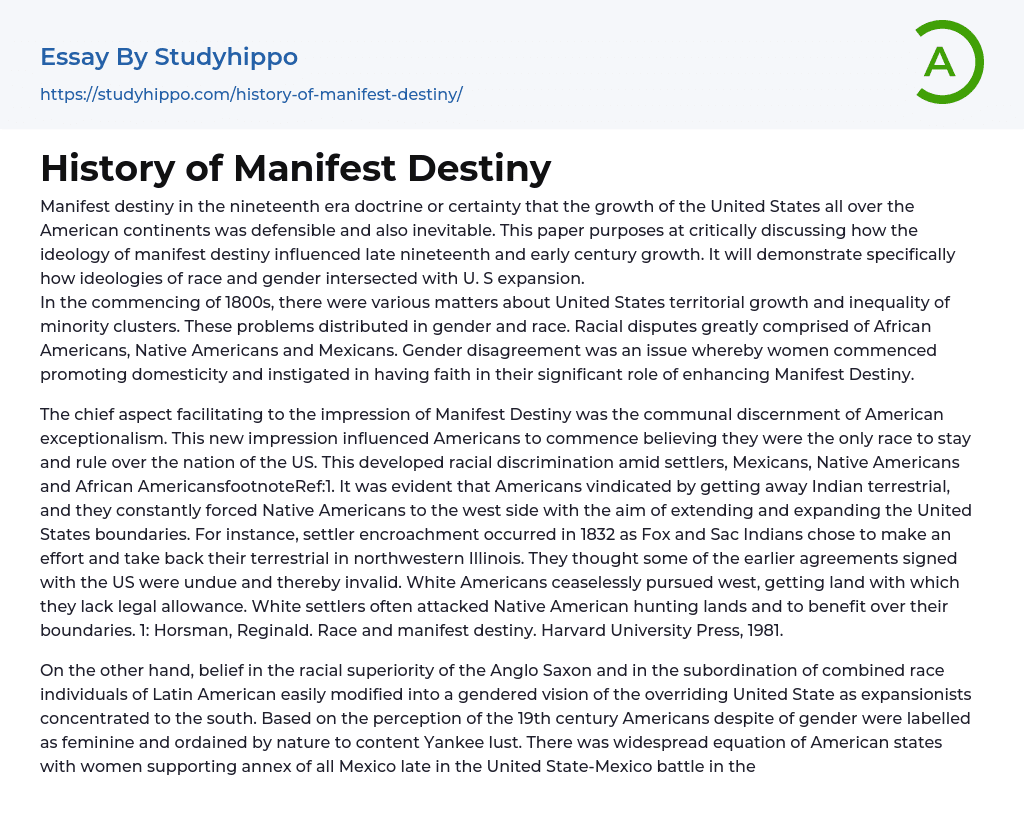Manifest destiny, a doctrine in the nineteenth era, exuded a sense of certainty about the justifiability and inevitability of the United States' expansion throughout the American continents. This paper aims to analyze how the ideology of manifest destiny impacted the growth of the late nineteenth and early century. Moreover, it will delve into the intersection of race and gender ideologies with manifest destiny.
At the beginning of the 1800s, there were concerns regarding the territorial expansion and social inequities within the United States. These issues encompassed various minority communities, including African Americans, Native Americans, and Mexicans.
Gender disagreement arose when women began promoting domesticity and embracing their important role in furthering Manifest Destiny. The belief in American exceptionalism greatly contributed to the idea of Manifest Destiny, leading Americans to believe they were the chosen race destined to gov
...ern the United States. This belief system fostered racial discrimination among settlers, Mexicans, Native Americans, and African Americans.
It was clear that Americans sought to displace Native Americans and consistently pushed them westward in order to expand the borders of the United States. This can be seen in a specific example from 1832, when Fox and Sac Indians attempted to reclaim their land in northwestern Illinois, believing that previous agreements with the US were unfair and invalid. White Americans continued to move westward, acquiring land without proper legal authorization. They frequently encroached upon Native American hunting grounds and took advantage of territorial boundaries.
1: Horsman, Reginald. Race and manifest destiny. Harvard University Press, 1981.
Despite the belief in the racial superiority of the Anglo Saxon and the subordination of individuals of mixed race from Latin America, this belief easily transformed into a gendere
vision of the expansionist United States focusing on the south. According to 19th century Americans, regardless of gender, they were characterized as feminine and naturally assigned to satisfy Yankee desires.
The selfsame fact of comparing American states to women who supported the annexation of all of Mexico towards the end of the United States-Mexico war in 1847 was prevalent. This equation, akin to the story of the Sabine virgins, allowed Mexicans to understand the value of their oppressors. Certain ideas of expansion made a direct connection between residency and political desire, obscuring the importance of race and gender in US residency and concealing a ingrained history of conquest and dominance that nurtured US expansion.
Grants colonialist determined for the Caribbean in the year 1870, as for the case of United States growth all over west of the continent collaborated with the concepts of Manifest Destiny that privileged race and gender as kinds of state belonging. When Blackwell informed on of the cynic Grant’s annexation is essential to advance, Blackwell notion that advancement in the topics founded on the attendance and initiative of the white men is only one of numerous instances of the techniques in which American progress was associated with whiteness and manhood, with race and gender as opposed to the more abstract values of egalitarianism and freedom. As a collaborated of woman suffrage, Blackwell was conversant with the fact that United States possessed diverse categories of civilians with diverse rights, and that residency did not general imply to political participation.
Bibliography
- Calhoun, Craig. "“New social movements” of the early nineteenth century. “Social Science History 17, no. 03 (1993): 385-427.
- Collins, Patricia Hill. "It's all in the family: Intersections of
gender, race, and nation." Hypatia 13, no. 3 (1998): 62-82.
- Abolitionism essays
- Adam Smith essays
- American History essays
- American Revolution essays
- Ancient Egypt essays
- Articles Of Confederation essays
- Atlantic Slave Trade essays
- Aztec essays
- Benjamin Franklin essays
- Civil Rights Act of 1964 essays
- Civil Rights Movement essays
- Civil war essays
- Cleopatra essays
- French And Indian War essays
- Gettysburg essays
- Great Depression essays
- Hurricane Katrina essays
- Industrial Revolution essays
- Jamestown essays
- Manifest Destiny essays
- Mccarthyism essays
- Patrick Henry essays
- Pearl Harbor essays
- Pocahontas essays
- Prohibition essays
- Pyramids essays
- Salem Witch Trials essays
- Slavery essays
- The New Deal essays
- Thirteen Colonies essays
- Westward Expansion essays




